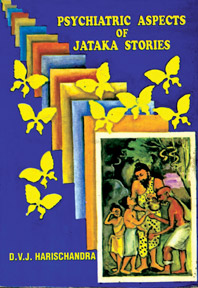The DVJ mark in medical literature
 Dr Dikwelle Vidanage Jayaratne Harischandra, more known as DVJ
Harischandra, is no more. He was one resourceful medical professional
who was linked to mass media in the dissemination of mental disorders,
and the need for treatments via some of the unconventional ways. Dr Dikwelle Vidanage Jayaratne Harischandra, more known as DVJ
Harischandra, is no more. He was one resourceful medical professional
who was linked to mass media in the dissemination of mental disorders,
and the need for treatments via some of the unconventional ways.
He used a language in his medical message to impart some of the
worldwide knowledge in the field in the simplest manner possible. His
demise brought much sadness to those who knew him in his field of
findings and treatments.
I chanced to know him as a result of his pioneer work titled as
‘Psychiatric Aspects of Jataka Stories’ (1998) which came to be written
as an intensive study and rediscovery of Jataka stories.
As Dr DVJ once told me, he had spent quite a number of hours in the
library reading and analyzing the human content which had gone to the
creation of Jataka stories. I was amazed at the wealth of substance that
he wanted to impart via Jataka stories.
The intention of the research is outlined as follows:
“This book will show those of you who are interested in Jataka
stories, and those of you who are interested in the human mind, how
these ancient stories can help in the understanding of the human mind
and especially in the study, prevention and treatment of its disorders.”
 One would wonder how the human mind could be understood via Jataka
stories. But Dr Harischandra is bold enough to bring forth a challenge
by outlining a scheme of detection and diagnosis process. As a basis for
the model, he outlines some of the salient and rare human experiences of
humans in interaction. He says that the study, prevention and treatment
of mental disorders are the main objectives of psychiatry. Having laid
down this basic theoretical perspective, he compares the models in the
orient as well as in the occident. He presents theories of such persons
as Curren and Guttman as laid down in clinical psychiatry. One would wonder how the human mind could be understood via Jataka
stories. But Dr Harischandra is bold enough to bring forth a challenge
by outlining a scheme of detection and diagnosis process. As a basis for
the model, he outlines some of the salient and rare human experiences of
humans in interaction. He says that the study, prevention and treatment
of mental disorders are the main objectives of psychiatry. Having laid
down this basic theoretical perspective, he compares the models in the
orient as well as in the occident. He presents theories of such persons
as Curren and Guttman as laid down in clinical psychiatry.
While possessing a sound, up to date, knowledge in psychiatry,
gathered from erudite research and following course work in places such
as Edinburgh University Medical Faculty, Royal College of Psychiatry, he
collates his erudition with the counterparts in orient.
It is said that Dr Harischandra had been a dedicated scholar in his
field of studies inherited from his professional field of psychiatry.
But as I knew him, intimately, he had not been given adequate time to
gather the same from the some unseen sources such as folklore and
religion. As a medical practitioner, he took time off to devote to the
so far missing area of research into folklore, religion and medicine. As
a lover of music, he too made links to the said field enhancing a better
climate for his studies.
As I knew him, he gathered his students into groups and attempted to
re-enact some of the human situations as found in Jataka stories. For me
one of the wonderful experiments was possible via the well known Jataka
named ‘Kusa Jataka’, which ahs parallels in other sources such as
‘Beauty and the Beast’.
On January 27, 1999, when ‘Psychiatric Aspects of Jataka Tales’ was
launhed at Mahaweli Centre, he spelled out briefly the reasons behind
his venture.
Initially as laid down in the work, he explained the nature of Jataka
stories and how they have influenced the culture of Sri Lankans
irrespective of the language and religious.
Then he exemplified his mission by analyzing how in the past the folk
narrative has embedded some of the mental disorders pertaining to the
field of psychiatry. The most significant factor as I perceived through
him, is therapeutic uses of Jataka stories, looking from a broader
perspective. This area he enlarged over period of at least 10 years.
I too had the rare privilege of being a speaker at the book launch.
It so happened that Dr Harischandra had referred to one of my research
projects on Jataka, which came to be published in Sinhala as ‘Jataka
Katha Sampradaya’ (1995). This work, he told me, had paved the way for
some of his findings on the embarked subject of understanding and
treatment of mental disorders. When he revealed the fact, having come to
see me personally, I felt highly elated.
In fact it was a mesmerized encounter for me to meet this erudite
scholar. Later on a three-participant tv programme too was telecast.
With me was Dr D N Athukorala, then President of Sri Lanka Medical
Association and the author Dr Harischandra. A stimulating discussion
ensued where Dr Athukorala stated that Dr Harischandra had selected an
area noteworthy for posterity.
Taking time off his normal schedules as a senior lecturer in Ruhunu
University and a consultant psychiatrist at teaching hospital, Galle, he
used to be seen more often in media channels trying to impart issues
relating to psychiatry. He was clear and farsighted in his expression as
a communicator. Though, we have sadly missed a great fellow man, and a
media personality we have with us the legacy he engraved as a
socio-medical vision.
[email protected]
|







